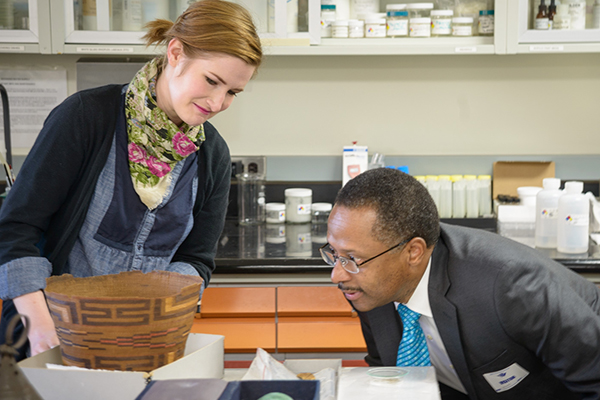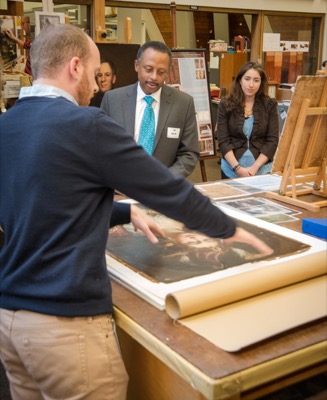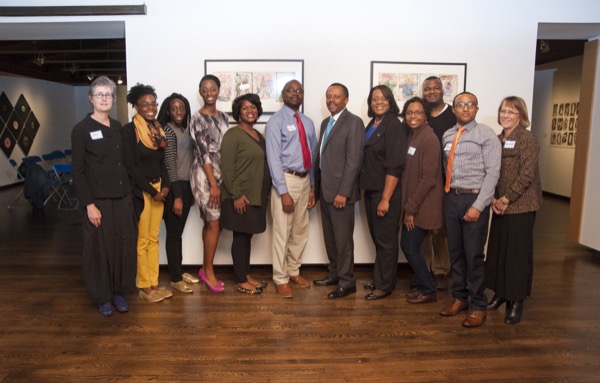


Promoting arts, humanities
Mellon Foundation president Earl Lewis shares views during campus visit
11:49 a.m., Nov. 6, 2015--Earl Lewis, president of The Andrew W. Mellon Foundation, spent a full day at the University of Delaware on Tuesday, Nov. 3, sharing personal and professional stories with the UD community, touring art conservation labs and sitting in on a research seminar — all before delivering a public lecture on the future of education.
Lewis, a distinguished social historian who became the foundation’s sixth president in 2013, met in the morning with a group of students, faculty and staff members in an informal “Life Story” session.
Campus Stories
From graduates, faculty
Doctoral hooding
The discussion group, which met in the Mechanical Hall art gallery, was a rare opportunity for participants to hear one another’s personal accounts of how they made their way along different educational and career paths, said Ann Ardis, director of UD’s Interdisciplinary Humanities Research Center and interim vice provost for graduate and professional education.
The group included graduate students in such fields as criminology, disaster science management, history and climatology and an undergraduate who has conducted research in Kenya and is planning to attend law school.
Their backgrounds varied — children of immigrants from Ghana and Nigeria, a native of Sierra Leone who worked with former child soldiers there before coming to the U.S., students who held jobs in counseling, financial services and as a corrections officer before pursuing graduate degrees. Some started college preparing for medical school but found a passion for history or political science instead.
“Education is a journey,” Ardis said as the discussion session ended. “You’ve given me a lot to think about in your own stories of how you got here.”
Lewis spoke to the group about his own education. Born in Virginia, he described himself as a member of the “transitional generation” of African Americans there, attending segregated schools until desegregation came when he was in 10th grade. After that tumultuous period, he said, he decided to leave his home state and attend college in Minnesota.
He went on to earn a doctorate in history and to hold faculty positions at the University of California at Berkeley, the University of Michigan and Emory University, where he also served as provost and executive vice president for academic affairs.
“With academic administration, I found that I actually could make a difference and have an effect on people’s lives,” Lewis told the group. He said he was about to take a job as a university president when he was offered the opportunity to head the Mellon Foundation.
Lewis said he called an old friend for advice, who summarized his choices this way: “begging for money or giving it away.” He chose the Mellon Foundation presidency, overseeing an organization that provided grants of about $235 million in support of higher education and culture in 2013.
The foundation’s mission is “to strengthen, promote, and, where necessary, defend the contributions of the humanities and the arts to human flourishing and to the well-being of diverse and democratic societies.”
In his role with Mellon, Lewis has championed the importance of diversifying the academy, enhancing graduate education, re-envisioning the liberal arts, exploring the role of digital tools for learning and connecting universities to their communities. He is the author or co-editor of seven books and is a fellow of the American Academy of Arts and Sciences.
Also during his visit to UD, Lewis visited Winterthur Museum, where he toured the conservation and scientific research laboratories and met with students in the graduate Winterthur/University of Delaware Program in Art Conservation (WUDPAC) and in preservation studies and with doctoral students in UD’s art history curatorial program.
In the labs, students described their conservation and technical study projects, including the scientific analysis and preservation of Native American basketry, a painting from 1940 by Grandma Moses, a Plexiglas cube by the artist Connie Fox, library materials and hand-colored photographic postcards from the 19th century and an export Chinese lacquer sewing cabinet
WUDPAC, a three-year program whose students earn a master’s degree, is one of only five graduate programs in art conservation in North America and one of only two jointly sponsored between a university and a museum.
The curatorial track for doctoral art history students was launched in 2011 with the support of a generous grant from the Andrew W. Mellon Foundation. The program is one of only a handful in the country to prepare future curators for careers in specialized historical art fields.
“Dr. Lewis’ connection to and engagement with our graduate students and faculty was energizing, and his visit enjoyed and appreciated by all,” said Debra Hess Norris, Unidel Henry Francis du Pont Chair in Fine Arts and director of WUDPAC.
After the Winterthur visit, Lewis returned to the Newark campus to attend a research seminar with faculty and staff affiliated with the College of Arts and Sciences’ Center for the Study of Diversity.
Late Tuesday afternoon, he delivered a talk, titled “Why Learn: In Search of Higher Education’s Future,” as part of UD’s Thought Leader Speaker Series.
Article by Ann Manser
Photos by Wenbo Fan at UD and Jim Schneck at Winterthur










